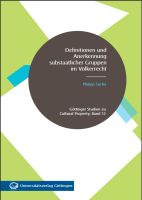Definitionen und Anerkennung substaatlicher Gruppen im Völkerrecht - Eine Untersuchung der rechtlichen Anwendung völkerrechtlicher Konstruktionen substaatlicher kollektiver Identitäten und aktueller Entwicklungen im Intergovernmental Committe der WIPO
Author(s)
Socha, Philipp,
Collection
AG UniversitätsverlageLanguage
GermanAbstract
Minorities, indigenous peoples and local communities have their own status in public international law. Given their position within the politics of a societal majority, they require a certain protection and enjoy particular group rights. However, it is unclear how to legally determine such culturally distinct sub-state groups. Who is entitled to the international legal guarantees of minority protection, who holds the right to self-determination and who owns traditional knowledge? Up until now the politically motivated debates in research and practice circled unsuccessfully around different approaches of definitions and criteria of cultural difference. This thesis shows that it is the recognition as a ‘minority’, ‘indigenous people’ or ‘local community’, which becomes the constitutive act for the legal status of a group. In contrast to the politically driven debates about the scope of definitions, the perspective of recognition, as presented in this book, makes the relevant processes and institutions visible. The recognition of sub-state groups can be contextualized in public international law in relation to the principles of the recognition of states, while also being anchored by an interdisciplinary approach. The perspective of recognition replaces the discussion about general criterial definitions and allows an identification of the power imbalances and conflicts of interests, which are inherent to the question of the legal status of culturally distinct sub-state groups. Minderheiten, indigene Völker und lokale Gemeinschaften haben in der Völkerrechtsordnung einen eigenen Status, da ihre Position in der Politik der Mehrheitsgesellschaft eines besonderen Schutzes bedarf und ihnen als Gruppe bestimmte Rechte zustehen. Ungeklärt ist dabei jedoch: Wie lassen sich diese kulturell distinkten substaatlichen Gruppen rechtlich bestimmen? Wem stehen die völkerrechtlichen Garantien des Minderheitenschutzes, das Recht auf Selbstbestimmung oder die Rechte an traditionellem Wissen zu? Erfolglos drehen sich die politisch geprägten Debatten in Wissenschaft und Praxis um Definitionsansätze und Kriterien kultureller Unterschiedlichkeit. Die vorliegende Arbeit zeigt, dass es die Anerkennung als ‚Minderheit‘, ‚indigenes Volk‘ oder ‚lokale Gemeinschaft‘ ist, die den konstitutiven Akt für den Status einer Gruppe bildet. Im Gegensatz zu den politischen Definitionsdebatten ermöglicht es die hier dargestellte Perspektive der Anerkennung, die statusrelevanten Prozesse und Institutionen in den Blick zu nehmen. Die Anerkennung substaatlicher Gruppen ist in Anlehnung an die Staatenanerkennung völkerrechtlich zu verorten und lässt sich interdisziplinär verankern. Die Perspektive der Anerkennung löst die Diskussion um allgemeine kriteriale Definitionen ab und ermöglicht die Machtungleichgewichte und Interessenkonflikte zu erkennen, die der Statusfrage von kulturell distinkten substaatlichen Gruppen inhärent sind.
Keywords
sub-state groups; minority protection; recognition; Geistiges Eigentum; Indigene Völker; Lokale Gemeinschaften; Menschenrechte; Minderheitenschutz; Traditionelles Wissen; Vereinte Nationen; Völkerrecht; Weltorganisation für geistiges EigentumDOI
10.17875/gup2017-1014ISBN
9783863952693OCN
1030819512Publisher
Universitätsverlag GöttingenPublication date and place
2017Classification
Society and Social Sciences


 Download
Download Web Shop
Web Shop